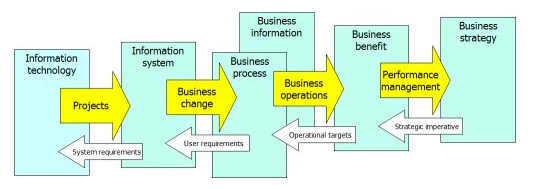Information Management
Information Management
- Snippet from Wikipedia: Information management
Information management (IM) is the appropriate and optimized capture, storage, retrieval, and use of information. It may be personal information management or organizational. Information Management for organizations concerns a cycle of organizational activity: the acquisition of information from one or more sources, the custodianship and the distribution of that information to those who need it, and its ultimate disposal through archiving or deletion and extraction.
This cycle of information organisation involves a variety of stakeholders, including those who are responsible for assuring the quality, accessibility and utility of acquired information; those who are responsible for its safe storage and disposal; and those who need it for decision making. Stakeholders might have rights to originate, change, distribute or delete information according to organisational information management policies.
Information management embraces all the generic concepts of management, including the planning, organizing, structuring, processing, controlling, evaluation and reporting of information activities, all of which is needed in order to meet the needs of those with organisational roles or functions that depend on information. These generic concepts allow the information to be presented to the audience or the correct group of people. After individuals are able to put that information to use, it then gains more value.
Information management is closely related to, and overlaps with, the management of data, systems, technology, processes and – where the availability of information is critical to organisational success – strategy. This broad view of the realm of information management contrasts with the earlier, more traditional view, that the life cycle of managing information is an operational matter that requires specific procedures, organisational capabilities and standards that deal with information as a product or a service.
Information Management Body of Knowledge (IMBOK)

The IMBOK process areas are:
- Projects: Adding new capacity, software, and hardware to information systems
- Business Change: Evaluating information to drive improvements in processes
- Business Operations: The day-to-day of a business. These will guide improvements based on updates to processes, and will hopefully increase benefits.
- Performance Management: Trying to ensure operations are running at peak capacit
See also Knowledge Management